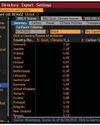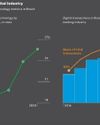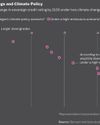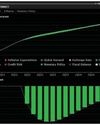
Two months into his tenure as China’s top banking regulator, Guo Shuqing did something his staffers had never witnessed from a senior Communist Party leader. Speaking in Beijing to officials and industry executives from across the country, he pledged to resign if he failed to snuff out the excesses that had been accumulating in China’s $40 trillion banking system for almost a decade. ¶ “This is a leader’s responsibility,” Guo said, according to people familiar with the April 2017 speech who asked not to be named discussing an internal matter. ¶ His comments jolted the audience. Not only is it extremely rare for a high-ranking Chinese official to admit the possibility of defeat, but those listening also understood the enormity of Guo’s task. As steward of the world’s largest banking system —it’s twice the size of the U.S.’s—the 63-year-old arguably has the hardest job in global finance. And it’s getting more difficult by the day. China faces its most uncertain economic environment since the global recession a decade ago, a state of affairs further complicated by the civil unrest in Hong Kong. ¶ Guo’s priorities— keeping China’s financial system stable and chipping away at the implicit state guarantees that underpin everything, including asset-management products and bank deposits are maddeningly contradictory. To create a more sustainable system where financial risk and return go hand in hand, he must convince investors, lenders, and local governments that Beijing won’t come to the rescue when asset prices fall or borrowers default. But removing the government backstop could trigger a “rapid and chaotic” repricing of risk that results in exactly the kind of crisis Guo is trying to prevent, says Michael Pettis, a finance professor at Peking University and former banker at Bear Stearns Cos.
This story is from the {{IssueName}} edition of {{MagazineName}}.
Start your 7-day Magzter GOLD free trial to access thousands of curated premium stories, and 9,000+ magazines and newspapers.
Already a subscriber ? Sign In
This story is from the {{IssueName}} edition of {{MagazineName}}.
Start your 7-day Magzter GOLD free trial to access thousands of curated premium stories, and 9,000+ magazines and newspapers.
Already a subscriber? Sign In

See Which Countries Are Falling Behind On Climate Change
Under the Paris Agreement, 190 countries and the European Union pledged to take steps to hold the global temperature rise to less than 2C (3.6F) from preindustrial levels—and preferably 1.5C.

Billionaires Vie for the Future of Brazilian Finance
An escalating battle between two billionaires is upending the financial community in São Paulo, Latin America’s wealthiest city.

Ford Foundation's Darren Walker: ‘We Have to Get Uncomfortable'
DARREN WALKER, 62, disrupted his Wall Street life more than 25 years ago when he left what is now UBS Group AG to volunteer at a school and eventually pursue a career in community development and philanthropy. Since 2013 he’s been at the pinnacle of the philanthropic world as president of the Ford Foundation, created by the family of automaker Henry Ford during the Great Depression to advance human welfare.

Fueling the Ener Transition
I MAY BE BIASED, but some of the most important research and data on the Bloomberg terminal lies in one of its lesser-known functions: {BNEF }

Dig Into Analysts' Estimates for Disruptive Companies
THE PANDEMIC ERA generated a whole wave of disruptive companies as it accelerated the introduction of new products and services in areas including artificial intelligence, digitization, electronic payments, online meeting platforms, and virtual currencies.

Climate Risks Come for Sovereign Credit
FOR YEARS climate scientists have warned about the ferocious wildfires and hurricanes that are now overwhelming many communities. Today alarms are ringing about a related financial danger: risks lurking within government bonds, the biggest part of the global debt market.

Responsible-Investing Pioneer Lydenberg Says ESG Needs An Upgrade
STEVE LYDENBERG’S passion for social change was inspired by anti-Vietnam War demonstrations, consumer boycotts, and the movement to divest from apartheid South Africa. But he didn’t take to the streets. Instead, Lydenberg turned to the world of finance to help catalyze societal change.

Engine No. 1's Grancio: ‘People Will Appreciate an Economic Argument'
ENGINE NO. 1 sent shock waves across corporate America in May when the fledgling investment firm won a boardroom battle with Exxon Mobil Corp., securing three seats on the oil and gas giant’s board after purchasing only about $40 million of its stock.

Find Out Which Companies May Ramp Up Payouts After Covid
AS THE PANDEMIC DISRUPTED business last year, many companies cut or suspended dividends. Which will boost their payouts when economies pick up again?

Get Into the Minds of Central Bankers as They Navigate Shocks
HAVE YOU EVER WONDERED how central bankers forecast the impact of shocks on the economy?